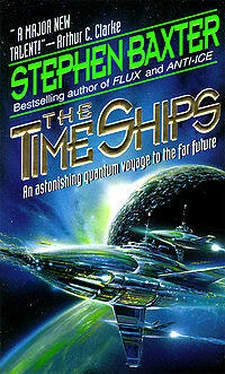Nebogipfel hauled his fragments of Time-Car up onto the floor by a little ladder I made for him, and continued his dogged reconstruction there.
One day, as I made my way through the forest, I became aware of a pair of bright eyes studying me from a law branch.
I slowed, taking care not to make any jerky movements, and slipped my bow from my back.
The little creature was perhaps four inches long, and rather like a miniature Lemur. Its tail and face were rodent-like, with gnawing incisors quite clear at the front; it had clawed feet and suspicious eyes. It was either so intelligent that it thought it should fool me into ignoring it by its immobility — or else so stupid that it did not recognize any danger from me.
It was the work of a moment to fit the string of the bow into the notch of an arrow, and fire it off.
Now my hunting and trapping skills had improved with practice, and my slings and traps had become moderately successful; but my bows and arrows much less so. The construction of my arrows was sound enough, but I could never find wood of the right flexibility for the bows. And generally, by the time my clumsy fingers had loaded up the bow, most of my targets, bemused by my antics, were well able to scamper for cover.
Not so this little fellow! He watched with no more than dim curiosity as my skewed arrow limped through the air towards him. For once my aim was true, and the flint head pinned his little body to the tree trunk.
I returned to Nebogipfel, proud of my prize, for mammals were useful to us: not just as sources of meat, but for their fur, teeth, fat and bones. Nebogipfel studied the little rodent-like corpse through his slit-mask.
“Perhaps I shall hunt down more of these,” I said. “The little creature really didn’t seem to understand what danger he was in, right until the end. Poor beast!”
“Do you know what this is?”
“Tell me.”
“I believe it is Purgatorius.”
“And the significance—?”
“It is a primate: the earliest known.” He let himself sound amused.
I swore. “I thought I was done with all this. But even in the Palaeocene, one cannot avoid meeting one’s relatives!” I studied the tiny corpse. “So here is the ancestor of monkey, and man, and Morlock! The insignificant little acorn from which will grow an oak which will smother more worlds than this earth… I wonder how many men, and nations, and species, would have sprung from the loins of this modest little fellow, had I not killed him. Once again, perhaps I have destroyed my own past!”
Nebogipfel said, “We cannot help but interact with History, you and I. With every breath we take, every tree you cut down, every animal we kill, we create a new world in the Multiplicity of Worlds. That is all. It is unavoidable.”
After that, I could not bring myself to touch the flesh of the poor little creature. I took it into the forest and buried it.
One day I set myself to follow our little fresh-water stream westwards towards its source, in the interior of the country.
I set off at dawn. Away from the coast, the tang of salt and ozone faded, to be replaced by the hot, moist scents of the dipterocarps forest, and the overpowering perfume of the crowding flowers. The going was difficult, with heavy growth underfoot. It became much more humid, and my cap of nut-fiber was soon soaked through; the sounds around me, the rustling of vegetation and the endless trills and coughs of the forest, took on a heavier tone in the thickening air.
By mid-morning I had traveled two or three miles, arriving somewhere in Brentford. Here I found a wide, shallow lake, from which flowed our stream and a number of others, and the lake was fed in turn by a series of minor brooks and rivers. The trees grew close around this secluded body of water, and climbing plants clung to their trunks and lower branches, including some I recognized as bottle gourds and loofahs. The water was warm and brackish, and I was wary of drinking it, but the lagoon teemed with life. Its surface was covered by groupings of giant lilies, shaped like upturned bottle-tops and perhaps six feet wide, which reminded me of plants I had once seen in Turner’s Waterlily House in the Royal Botanic Gardens at Kew. (It was ironic, I thought, that the eventual site of Kew itself was less than a mile from where I stood!) The lilies’ saucers looked strong and buoyant enough for me to stand on, but I did not put this hypothesis to the test.
It was the work of a few minutes to improvise a fishing rod, made from the long, straight trunk of a sapling. I fixed a line to this, and I baited a hook of Time-Car metal with grubs.
I was rewarded within a few minutes by brisk tugs of the line. I grinned to imagine the envy of some of my angling friends — dear old Filby, for instance — at my discovery of this un-fished oasis.
I built a fire and ate well that night of broiled fish and tubers.
A little before dawn I was woken by a strange hooting. I sat up and looked about me. My fire had more or less died. The sun was not yet up; the sky had that unearthly tinge of steel blue which prefigures a new day. There was no wind, and not a leaf stirred; a heavy mist lay immobile on the surface of the water.
Then I made out a group of birds, a hundred yards from me around the rim of the lake. Their feathers were dun brown and each had legs as long as a flamingo’s. They stepped about the waters of the lake’s margin, or stood poised on one leg like exquisite sculptures. They had heads shaped like those of modern ducks, and they would dip those familiar-looking beaks through the shimmering surface and sweep through the water, evidently filtering for food.
The mist lifted a little, and more of the lake was revealed; I saw now that there was a great flock of these creatures (which Nebogipfel later identified as Presbyornis ) — thousands of them, in a great, open colony. They moved like ghosts through that vaporous haze.
I told myself that this location was nowhere more exotic than the junction of Gunnersbury Avenue with the Chiswick High Road — but a vision more unlike England it is hard to conjure!
As the days wore on in that sultry, vital landscape, my memories of the England of 1891 seemed more and more remote and irrelevant. I found the greatest of satisfactions in my building, hunting and gathering; and the bathing warmth of the sun and the Sea’s freshness were combining to give me a sense of health, strength and immediacy of sensory experience lost since childhood. I had done with Thinking, I decided; there were but two conscious Minds in all this elaborate panoply of Palaeocene life, and I could not see that mine would do me much good from now on, save for keeping me alive a little longer.
It was time for the Heart, and the Body, to have their say. And the more the days wore away, the more I gathered a sense of the greatness of the world, the immensity of time — and the littleness of myself and my concerns in the face of that great Multiple panorama of History. I was no longer important, even to myself; and that realization was like a liberation of the soul.
After a time, even the death of Moses ceased to clamor at my thoughts.
Nebogipfel’s screaming woke me with a start. A Morlock’s voice, raised, is a kind of gurgle: queer, but quite chilling to hear.
I sat up in the cool darkness; and for an instant I imagined I was back in my bed in my house on the Petersham Road, but the scents and textures of the Palaeocene night came crowding in on me.
I scrambled out of my pallet and jumped down, off the floor of the shelter, and to the sand. It had been a moonless night; and the last stars were fading from the sky as the sun approached. The sea rolled, placid, and the wall of forest was black and still.
Читать дальше
Конец ознакомительного отрывка
Купить книгу









